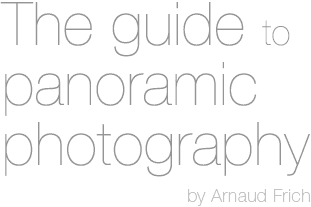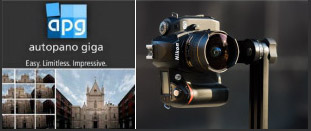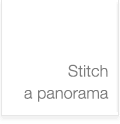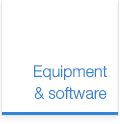Review of the panoramic head Roundabout-NP
The panoramic head Roundabout-NP is a new spherical head recently released, original in many ways and made in Germany, which tends to be a guarantee of quality. On a competitive market, it shows strong selling points, and its price is one of them. To sum up, this new panoramic head is interesting to review!
 The panoramic head Roundabout-NP is one these spherical heads. It's rather big, with two click-stop options on the base (every 5° or 15°), two different lengths of lower plates (N and L) and two options of fastening systems for the camera: the very famous Manfrotto M323 and Arca Swiss. It is rather designed for owners of 24x36 cameras with a big wide-angle zoom (like a 24-70mm F2.8) or a small telephoto lens, but we'll see that it can also support effortlessly an intermediate size like my Pentax 645Z... which is surprising for this weight! The panoramic head Roundabout-NP is one these spherical heads. It's rather big, with two click-stop options on the base (every 5° or 15°), two different lengths of lower plates (N and L) and two options of fastening systems for the camera: the very famous Manfrotto M323 and Arca Swiss. It is rather designed for owners of 24x36 cameras with a big wide-angle zoom (like a 24-70mm F2.8) or a small telephoto lens, but we'll see that it can also support effortlessly an intermediate size like my Pentax 645Z... which is surprising for this weight!
When you hold it in your hands, what strikes you first is:
-
Its excellent manufacturing quality,
-
A very good absorption of vibrations despite its light weight,
-
Its smoothness of use,
-
It is monoblock (it can be separated, but it's not very easy).
You know immediately that you have here is quality equipment, well designed, and with strong design choices! I'm enthusiastically starting this new review, especially since this head is very cheap for its level of quality...

Presentation of the panoramic head Roundabout-NP
The panoramic head Roundabout-NP is a monoblock head - different depending the options you pick - delivered in a good quality carton box. It looks reliable. Everything is well protected and stored.

This box contains the whole head that will be configured according to the options you chose when ordering – since it is monoblock and mounted with the quick fastening system you picked. (My review model is equipped with the universal system Arca Swiss)
- The full panoramic head (with your preferred quick fastening + lower plate model N (Normal) or L (Large) + notched base 5° or 15°),
- A small bag with two Allen wrenches, a small additional screw for the quick fastening plate and a Kodak screw thread reducer 1/4 > 3/8.

Even if the vertical arm can be separated from the lower plate by unscrewing two screws (as I'll show you later), it is not something you can do easily in the field so you'd rather consider this head a monoblock that must be carried mounted. Then it is operational right away. Here's how to turn a weakness into strength!
Techs & specs
| |
Roundabout-NP |
Average price: from 259 to 310 € incl. taxes (depending on the options) |
|
Quick fastening |
Yes: Arca Swiss and Manfrotto (M323) |
| |
Load capacity |
About 2.5 kg (pretty easily because very stable) |
| |
Height of use |
29 cm |
| |
Range of motion of the plates |
From 3 to 16 cm upwards and from 0 to 5.5 or 9.4 cm downwards |
| |
bubble level |
Yes |
| |
Dismountable |
No (though the vertical arm can be separated) |
| |
Number of notches |
Every 5 or 15° depending on your option |
| |
Material |
Aluminum |
| |
Weight |
About 1.2 kg |
|
Company |
|
|
Shop the head Roundabout-NP (Be sure to check your model before placing your order)
|
Dimensions and robustness/stability
Since it is monoblock, this head is bulkier. It can be separated but not very easily so the only "reasonable" option would be to do it at home. Here are a few values I measured.

- The camera can slide on the upper plate on 13 cm in depth,
- On model N the lower plater can slide on 55 mm and on model L on 94mm.
 What's best: model N or L? If you don't have a booster or don't use it on your camera 24x36 or intermediate format, model N will be more than enough. Otherwise, choose model L. What's best: model N or L? If you don't have a booster or don't use it on your camera 24x36 or intermediate format, model N will be more than enough. Otherwise, choose model L.

The most annoying thing when you're carrying it is the impossibility to separate easily the vertical arm of the lower plate. The head Roundabout-NP is monoblock unless you want to bother unscrewing the two screws holding the vertical arm; they're not easy to access though and you'll probably have to give it a few tries before you manage to unscrew them completely – photo below).

How to carry the Roundabout-NP head
Even if you'll get to understand all the good points that come with making a head that can't be separated (it can be separated, but not easily at all in the field), there's still the question of how to carry it around and it is obviously not a detail! It is both very long (31 cm) and very high (22.5 cm). I think the only solution is to store it flat because it's not too thick (7 cm) in the biggest compartment of your backpack!

Monoblock, it won't even fit in a big photo bag instead of the telephoto lens, for instead, but...

It will effortlessly fit in the front pocket of many big-size photo bags bought by reflex 24x36 users that use many different lenses, or by photographers with intermediate sized cameras like me because it tends to be thinner than its competitors. (Here bag Tamrac Expedition 8).
 My opinion! True, it can't be separated. But its users often have large photo bags where it will fit in the end and its weakness will then become a strength, because it is operational right away and perfectly set (in addition to its very quick absorption of vibrations, its light weight, etc.) My opinion! True, it can't be separated. But its users often have large photo bags where it will fit in the end and its weakness will then become a strength, because it is operational right away and perfectly set (in addition to its very quick absorption of vibrations, its light weight, etc.)
 What about stability? What about stability?
 I just never saw such a light head (around 1 kilo) absorbing vibrations so efficiently. In fact, when you manipulate it, you can feel that it's not that stable (offering a "feeling" of robustness" almost equivalent to the Nodal Ninja Ultimate M2), yet it absorbs vibrations almost just as fast. The manufacturer recommends not to exceed a load of 2.5 kg but it can bear them effortlessly. The meticulous design and the choice of materials provide a very quick absorption of vibrations. Too bad it is so bulky because being so stable for 1.2 kg only makes it the ideal travel partner, even with an intermediate-size camera like the Pentax 645Z – which comes as even more of a surprise. It is clearly one of the striking qualities of this panoramic head. I just never saw such a light head (around 1 kilo) absorbing vibrations so efficiently. In fact, when you manipulate it, you can feel that it's not that stable (offering a "feeling" of robustness" almost equivalent to the Nodal Ninja Ultimate M2), yet it absorbs vibrations almost just as fast. The manufacturer recommends not to exceed a load of 2.5 kg but it can bear them effortlessly. The meticulous design and the choice of materials provide a very quick absorption of vibrations. Too bad it is so bulky because being so stable for 1.2 kg only makes it the ideal travel partner, even with an intermediate-size camera like the Pentax 645Z – which comes as even more of a surprise. It is clearly one of the striking qualities of this panoramic head.
|
What about manufacturing quality?
Truly excellent! Every detail has been thought carefully. The finishing is impressive, the click-stops are smooth but firm, the movements are fluid. It breathes quality and obviously, "Made in Germany" isn't just a selling point here! |

How to use the Roundabout-NP head
As for all panoramic heads, the sliding plates of the head Roundabout-NP are used to place the nodal point of your lens above the rotary axis of the head and in the tilting axis of the vertical arm to get perfect overlap zones in multirange photography and for panorama stitching. This head has rather long plates which enable to fasten many combinations of reflex camera/wide-angle zoom lens or telephoto lens ideally.
Fastening the head Roundabout-NP on a tripod
The standard screw thread is the Kodak 3/8 but the head is sold with a reducer to 1/4. This head can thus be fastened on almost any decent tripod.

Turn clockwise to clamp the base firmly on your tripod. Prehension is very easy because the base is high enough for your fingers to fit. Well designed, once again!
Fastening the camera on the upper plate
Almost all panoramic heads feature a proprietary quick fastening system or... none at all, except for a classic Kodak 1/4 screw. But when you're working with a tripod, you often have a quick fastening plate that you leave under your camera and that you must then remove, or you have to fasten directly a quick fastening of your "classic" head's brand directly on the upper plate. Sometimes, it hasn't been anticipated and the quick fastening system tends to slide slightly under the weight of the camera. Roundabout-NP sells its head directly with a standard Manfrotto M323 plate or a great Arca Swiss (photo below).

I removed the quick fastening plate coming with the head (shown in the photo below on the right) because I have my own under my camera.
Once the two fastening screws (above) are slightly unscrewed, the quick fastening system can slide smoothly on 13 cm when you're setting your camera.
Below are the two quick-fastening options available:

 Piece of advice! If, like I do, you already have a standard Arca Swiss quick fastening system, you won't have to use the cork plate (above on the right). Just take it off and slide your camera directly in the quick fastening system. Very convenient! Piece of advice! If, like I do, you already have a standard Arca Swiss quick fastening system, you won't have to use the cork plate (above on the right). Just take it off and slide your camera directly in the quick fastening system. Very convenient!
How to set your camera at the nodal point (entrance pupil)
For quick, easy and "perfect" results on first try, you now know that you have to place the entrance pupil (or nodal point) of your lens above the rotary axis of your lens. This is why special heads" called "panoramic" like this Roundabout-NP were created.
1 - Center your camera on the head Roundabout-NP
I told you in the introduction of this review that this head was standing out in more than a way. For instance, the system used to center the camera. Let's see that now...
The manufacturer took as granted that even if you change your lens from time to time, changing the whole camera is a lot less frequent so that even if you would have to re-center your camera, that wouldn't happen too often or at least not at every photo shooting nor during your photo shootings. So the system they chose isn't quick and easy at all, but it's very efficient and stable since the horizontal sliding plate is fastened by four screws almost 8 cm long.

 My opinion! This system is surprising at first! Then, when you try it, you discover that it is in fact well thought because the clamping is made on a wide surface, which gives stability, and since the manufacturer wanted this head reliable and quick to set, the result is pretty convincing. Finally, not having to remember where this lower plate should be placed for your camera is not that bad! My opinion! This system is surprising at first! Then, when you try it, you discover that it is in fact well thought because the clamping is made on a wide surface, which gives stability, and since the manufacturer wanted this head reliable and quick to set, the result is pretty convincing. Finally, not having to remember where this lower plate should be placed for your camera is not that bad!

Once it is centered, you just have to clamp the four Allen screws under the base (photo above).
 My recommendation! This head is sold with two different horizontal plates of different lengths (so be sure to choose the one you need when placing your order) My recommendation! This head is sold with two different horizontal plates of different lengths (so be sure to choose the one you need when placing your order)
- Size N: from 0 to 55 mm
- Size L: from 0 to 94 mm
For my Pentax 645Z with which I made the photos for this review, the model N is enough. The model L should be recommended to photographers who use a reflex + booster.
2 - Align the nodal point of the lens on the tilting axis of the Roundabout-NP head
The flawless design of this Roundabout-NP head turns aligning the nodal point (or entrance pupil) of your lens with the tilting axis of the camera into a piece of cake. The movements are incredibly smooth and the screws are very well placed. Delightful and innovative, at least at that price.

Even with a heavy camera like this intermediate format, unscrewing very slightly both fastening screws will enable you to slide your quick fastening plate very smoothly. Another striking point of a head that is very comfortable to use.
3 - Tilt and turn the Roundabout-NP head
Thanks to its design and to a very efficient choice of materials, this head is very stable, like I already underlined before: not far at all behind my reference, the Nodal Ninja Ultimate M2, twice as expensive and noticeably heavier! And the most incredible thing is that the tilting axis isn't oversized at all! It is another striking point of this panoramic head.
 a - Tilting of the head - The tilting of this head is notched every 7.5°, on both models and there's not continuous mode. However, the notches are close enough to one another to make it easy to find your ideal setting. a - Tilting of the head - The tilting of this head is notched every 7.5°, on both models and there's not continuous mode. However, the notches are close enough to one another to make it easy to find your ideal setting.
 My opinion! As time goes by, I find notched tilting axis more and more convenient if they have enough notches, like this one (7.5°). It is a small security, and above all a better marking point than the marked reglet, never easy to read nor to access. My opinion! As time goes by, I find notched tilting axis more and more convenient if they have enough notches, like this one (7.5°). It is a small security, and above all a better marking point than the marked reglet, never easy to read nor to access.
NB. Note that the axis is far from being oversized and yet particularly stable. And here again, you'll appreciate the smoothness of rotation and the click-stops. This head is very pleasant to manipulate. And to finish with, note that the tilting axis can't be blocked completely so if you "force" the plate a little, it will rotate slowly. It is a welcome security. Moreover, I didn't note any weakness or tendency to rotate by sliding, even with my Pentax 645Z + a 120 mm Macro.
 b - Click-stops on the rotary axis - Like you can see, the base isn't multi-notched. When you place your order, you can choose between two models: b - Click-stops on the rotary axis - Like you can see, the base isn't multi-notched. When you place your order, you can choose between two models:
- 15R: one notch every 15°
- 5R : one notch every 5°
It is obviously not as convenient as a multi-notched base but it has at least two qualities: the price is of course cheaper and the base is noticeably less bulky and heavy.
 My opinion! True, you lose in flexibility what you gain in weight and size. I think it makes up for it. I chose the 5° option because I'll rather use this head with my Pentax when I'm on the road so I need the head not to rotate too much between two notches. All I have to do is count how many notches I need between two consecutive photos. Yes, it does require a bit of focus, but it's definitely not impossible! Anyway, I got used to it with the RD-8 of the Ultimate M-2 I currently use. In the end, in the field, it's easier and quicker because whatever focal you're using, you don't need to change your notches... just count! My opinion! True, you lose in flexibility what you gain in weight and size. I think it makes up for it. I chose the 5° option because I'll rather use this head with my Pentax when I'm on the road so I need the head not to rotate too much between two notches. All I have to do is count how many notches I need between two consecutive photos. Yes, it does require a bit of focus, but it's definitely not impossible! Anyway, I got used to it with the RD-8 of the Ultimate M-2 I currently use. In the end, in the field, it's easier and quicker because whatever focal you're using, you don't need to change your notches... just count!
If you exclusively use very short focals or fisheye lenses, I will of course recommend you the 15° model.
Then, note that the Roundabout-NP head is one of the few heads offering the possibility to clamp the clamping screw between the upper plate and the notched base a bit tighter in order to adjust the friction hence the gap and stability. Very convenient...

You need a 10 wrench to clamp this screw and find the exact gap you're looking for. Perfect, here again!

Conclusion and evaluation!
How pleasant to review a truly original product with real design choices! The head Roundabout-NP is great in certain ways. It is designed to absorb vibrations (even if it doesn't reach the level of stability of a Nodal Ninja Ultimate), be very quick to install in the field and be accurate. I have to say that it exceeds all of these goals, more than a lot of average heads I reviewed. If you can figure out how to carry it, you'll fall under its spell!
Evaluation
| |
Roundabout-NP |
|
|
|
Manufacturing quality |
|
|
| |
Robustness |
|
|
|
| |
Stability |
 |
|
|
| |
Size once mounted |
|
|
| |
Size dismounted |
|
|
| |
Setting the base |
|
|
| |
Value for money |
|
|
| |
I LOVE... |
- A ratio between vibrations absorption and weight I'd never seen before!
- manufacturing and design quality,
- smoothness of use,
- truly original head with real choices,
- possibility to use your wide-angle lenses, even the big ones, at the nodal point,
- quick to set: it is immediately ready!
- a big favorite!
|
|
| |
I REGRET... |
- Size mounted and dismounted: the vertical arm and the lower plate are monoblock,
- the impossibility to carry it in a small photo bag,
- the impossibility to change the number of notches on the base: be sure of your choice when you order!
- the vertical arm can't be turned over to shoort the nadir.
|
|
| |
OVERALL RATING |
9 / 10 |
|
|
My opinion: It won't match everyone's requirements but this head is great! It's a product full of true design choices, so you'll either love it or hate it. What I'm sure about is that it's an excellent product that absorbs vibrations very quickly despite a rather light weight and can thus handle my Pentax 645Z effortlessly. It's the first time I review a head able to make this full split! Those of you for which its "defects" are not really a problem will love it, I'm sure. A big crush despite its firm choices.
Shop the Roundabout-NP head

|

|
 a - Tilting of the head - The tilting of this head is notched every 7.5°, on both models and there's not continuous mode. However, the notches are close enough to one another to make it easy to find your ideal setting.
a - Tilting of the head - The tilting of this head is notched every 7.5°, on both models and there's not continuous mode. However, the notches are close enough to one another to make it easy to find your ideal setting.  My opinion! As time goes by, I find notched tilting axis more and more convenient if they have enough notches, like this one (7.5°). It is a small security, and above all a better marking point than the marked reglet, never easy to read nor to access.
My opinion! As time goes by, I find notched tilting axis more and more convenient if they have enough notches, like this one (7.5°). It is a small security, and above all a better marking point than the marked reglet, never easy to read nor to access. b - Click-stops on the rotary axis - Like you can see, the base isn't multi-notched. When you place your order, you can choose between two models:
b - Click-stops on the rotary axis - Like you can see, the base isn't multi-notched. When you place your order, you can choose between two models: My opinion! True, you lose in flexibility what you gain in weight and size. I think it makes up for it. I chose the 5° option because I'll rather use this head with my Pentax when I'm on the road so I need the head not to rotate too much between two notches. All I have to do is count how many notches I need between two consecutive photos. Yes, it does require a bit of focus, but it's definitely not impossible! Anyway, I got used to it with the RD-8 of the Ultimate M-2 I currently use. In the end, in the field, it's easier and quicker because whatever focal you're using, you don't need to change your notches... just count!
My opinion! True, you lose in flexibility what you gain in weight and size. I think it makes up for it. I chose the 5° option because I'll rather use this head with my Pentax when I'm on the road so I need the head not to rotate too much between two notches. All I have to do is count how many notches I need between two consecutive photos. Yes, it does require a bit of focus, but it's definitely not impossible! Anyway, I got used to it with the RD-8 of the Ultimate M-2 I currently use. In the end, in the field, it's easier and quicker because whatever focal you're using, you don't need to change your notches... just count!








 The panoramic head
The panoramic head 







 I just never saw such a light head (around 1 kilo) absorbing vibrations so efficiently. In fact, when you manipulate it, you can feel that it's not that stable (offering a "feeling" of robustness" almost equivalent to the Nodal Ninja Ultimate M2), yet it absorbs vibrations almost just as fast. The manufacturer recommends not to exceed a load of 2.5 kg but it can bear them effortlessly. The meticulous design and the choice of materials provide a very quick absorption of vibrations. Too bad it is so bulky because being so stable for 1.2 kg only makes it the ideal travel partner, even with an intermediate-size camera like the Pentax 645Z – which comes as even more of a surprise. It is clearly one of the striking qualities of this panoramic head.
I just never saw such a light head (around 1 kilo) absorbing vibrations so efficiently. In fact, when you manipulate it, you can feel that it's not that stable (offering a "feeling" of robustness" almost equivalent to the Nodal Ninja Ultimate M2), yet it absorbs vibrations almost just as fast. The manufacturer recommends not to exceed a load of 2.5 kg but it can bear them effortlessly. The meticulous design and the choice of materials provide a very quick absorption of vibrations. Too bad it is so bulky because being so stable for 1.2 kg only makes it the ideal travel partner, even with an intermediate-size camera like the Pentax 645Z – which comes as even more of a surprise. It is clearly one of the striking qualities of this panoramic head.








